The challenge of garnering support for a Republican candidate for city council in heavily Democratic Washington, D.C., was evident on the evening of Oct. 6.
Only four people showed up in a meet-and-greet that David Krucoff held in a private home in the Van Ness neighborhood. If Krucoff, candidate for the Ward 3 seat, was disappointed by the low turnout, he did not show it.
He talked almost non-stop about his opposition to the plan for installing protected bike lanes on Connecticut Avenue, his disapproval of fare gate jumpers in the Metro, and his advocacy for retrocession, a plan for D.C. to become a part of Maryland.
Washington is a largely Democratic city where President Joe Biden received 92% of the vote in 2020 presidential election. The city’s voters have not elected a Republican member of the council since 2004, when Carol Schwartz was re-elected for an at-large seat. No Republicans have ever held a ward-level seat.
Who would take on such a long shot?
Krucoff is a third-generation Washingtonian, and a realtor by profession. He calls himself an “underdog,” but he said he believes he has a fair chance of winning the race against the Democratic candidate Matt Frumin, an attorney and former political appointee at the U.S. State Department during the Clinton administration. The Libertarian candidate is political activist Adrian Salsgiver.
“When I meet people, I keep on meeting Democrats. They say I am the first Republican they are ever going to vote for. They think that the council has gone too far to the left,” Krucoff said.
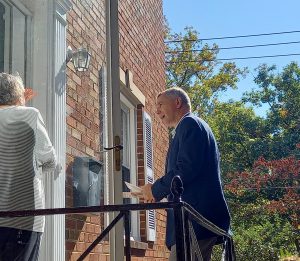
The Washington Post agreed with that view. It endorsed Krucoff, saying “one-party rule has been unhealthy for D.C., so we endorse Mr. Krucoff and urge Ward 3 voters to give him a close look.”
The last time The Washington Post endorsed a Republican for a ward seat was in 2010, when Dave Hedgepeth was running for Ward 3 against Democratic incumbent Mary Cheh, who won.
The Washington Post also said that Krucoff’s call for lower taxes, better support for the police and continuing mayoral control of schools are “the right positions.”
Krucoff does not think his Republican affiliation would be too big an obstacle to gain support from non-Republican voters. He calls himself “a centrist” and has been openly criticizing former President Trump.
“Trump is not only a pig, but he’s also an authoritarian. I’m a democracy guy,” Krucoff said.
In fact, when Krucoff ran unsuccessfully for D.C. delegate in U.S. House of Representatives in 2020, he was an independent candidate. Krucoff said his decision to run as a Republican this time was strategic.
“The party is a vehicle. It is not a religion to me,” Krucoff said.
However, being a Republican candidate in D.C. comes with disadvantages. As of Sept. 30, 76.6% of 503,740 registered voters in the city are Democrats and 16.5% don’t identify with a party, while Republicans represent only 5.3%, according to the city Board of Elections monthly report.
In terms of campaign finance, Krucoff is dwarfed by his Democratic opponent. As of Oct.31, Krucoff raised $94,526.00 while Frumin raised $301,145.47, according to the finance reports the campaign committee of each candidate filed to the city’s Office of Campaign Finance.
“It’s not easy in Ward 3 running as a Republican to recruit volunteers,” said John Muller, a long-time friend and an advisor to Krucoff.
“David is doing a lot of the groundwork that in other campaigns you’d have maybe teenagers or volunteers doing,” Muller said.
Krucoff’s campaign team consists of a few close friends and some consultants. In contrast, Frumin said he had “around 12 people on the core team” and “hundreds of volunteers.”
While Krucoff said the endorsement from The Washington Post gave a momentum to his campaign, Frumin garnered a wide range of endorsements from the Washington Teachers’ Union to Sierra Club D.C.
Tom Sherwood, a political analyst at WAMU 88.5, said in an email that the race is “a high hurdle” for Krucoff.
Sherwood pointed out that Frumin had strong support among both Democrats and much of the ward’s influential public school parents.
“Most political observers I know agree that Krucoff still needs to become better known in the remaining days of this campaign if he is to win an upset victory,” Sherwood said at the end of October.
Muller, who worked as a coalition director for students and veterans in Florida for John McCain’s campaign during 2008 presidential election, recalls similarities between McCain’s and Krucoff’s campaigns. “What they lack in resources or staff, they make up in charisma,” Muller said.
Muller described Krucoff as “spunky.”
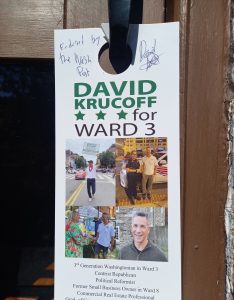
On one late October Saturday, Krucoff dashed back from a tennis court around 1 p.m. He fixed a sandwich, ate while standing, and rushed out to canvas.
Running up and down hundreds of stairs to the porches, Krucoff managed to talk to only a few residents.
“Every time I knock, only one out of every six doors is there a person,” Krucoff said nonchalantly. Then he walked to a meet- and-greet in a nearby apartment complex and mingled with voters for two hours.
While walking home, Krucoff came across a soccer field. He found an abandoned ball, went running up and kicked it.
It was a long shot, but he made it.
WAMU 88.5, D.C.’s NPR station, is owned by American University.

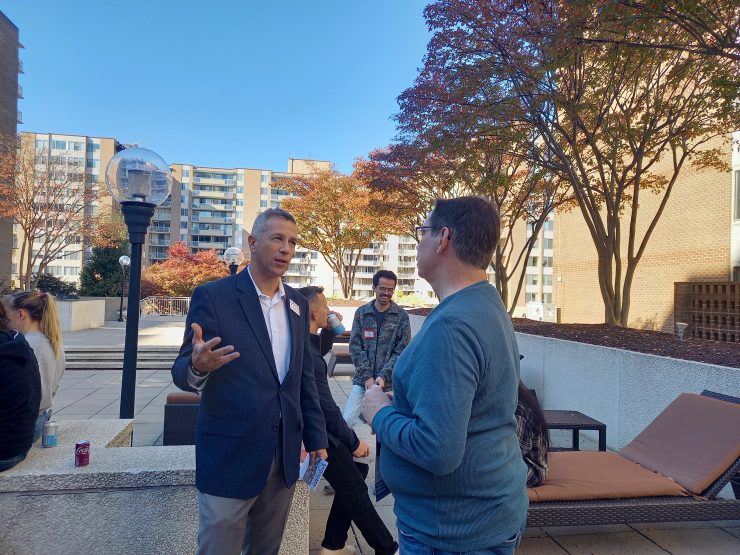

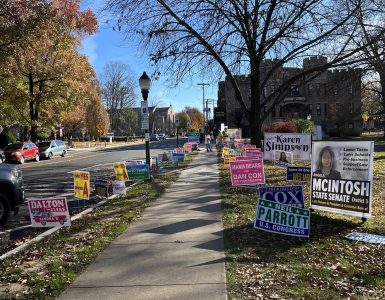
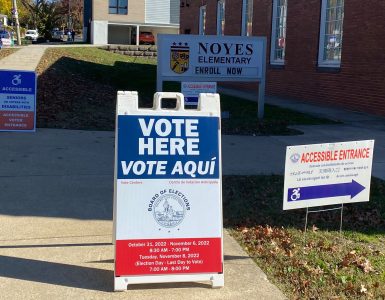










Add comment